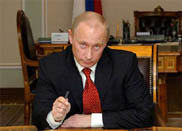Russia's Putin calls for measures to fight population decline
President Vladimir Putin said Wednesday that Russia must take steps to increase the birthrate, calling the persistent population decline of hundreds of thousands a year one of the most serious problems facing the country.

In his annual state of the nation address, Putin said there was a "consensus in society" that Russia's demographic problems must be tackled and indicated the government will take measures to encourage young couples to have more children.
Russia's population is dropping by about 700,000 a year, Putin said. The phenomenon began in the wake of the 1991 collapse of the Soviet Union, which afflicted economic hardships and uncertainty on much of the population, although Russia's economy has grown sharply in recent years, largely boosted by high world oil prices.
Childcare benefits should be increased and women who have a second child should be supported because they often are out of the work force for a long time, Putin said.
"We must at least stimulate the birth of a second child," Putin said, adding that concerns about housing, health care and education are prompting many families to stop at one.
The population decline that has shrunk Russia by millions is "the most acute problem of contemporary Russia," Putin said in the address to both houses of parliament.
He encouraged legislators to budget for more generous birth bonuses, childcare support subsidies and educational benefits for mothers to encourage women to have children.
"I am convinced that with such an approach, you will earn words of gratitude from millions of mothers, young families, all the citizens of our country," Putin said.
He also called on more Russians to take in foster children from institutions where about 200,000 orphans and abandoned children are interned.
Most Russian families are small, with couples usually having only one or two children. Putin and his wife have two daughters.
Russia's population dropped by about 4 percent to 142.7 million between 1993 and 2006, according to the Health Ministry. Experts attribute the plunge to post-Soviet economic turmoil that has badly hurt the state health care system, leading to a drop in birth rates and life expectancy. Increased poverty, alcoholism, soaring crime and emigration have also taken their toll, leading to an average life expectancy of just 66 years 16 years lower than Japan and 14 years lower than the European Union average, reports AP.
O.Ch.
Subscribe to Pravda.Ru Telegram channel, Facebook, RSS!


